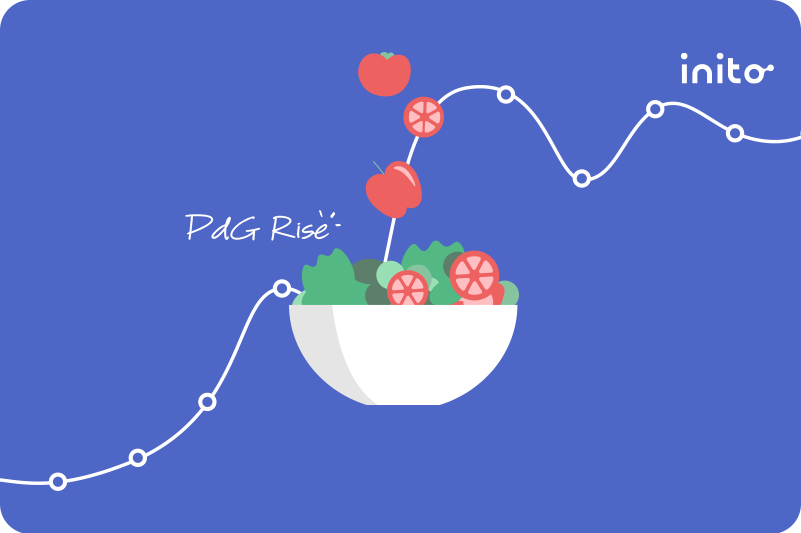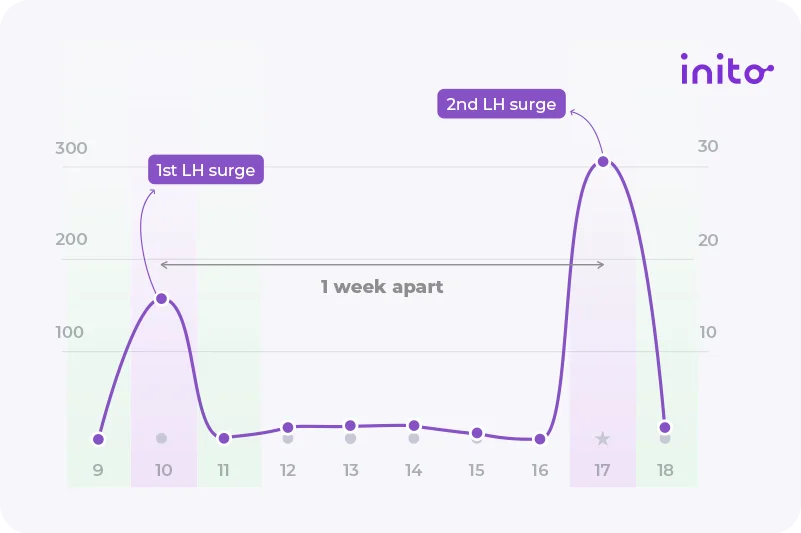Content table
Want to boost your progesterone to increase your chance of conceiving? You’ve come to the right place!
Progesterone is hailed “the pregnancy hormone” for a reason. It helps regulate your menstrual cycle and prepares the womb for pregnancy. But it also supports the implantation process and prevents miscarriage.
When progesterone levels get too low, it can make it difficult to get pregnant – and stay pregnant.
Luckily, there are many natural ways to boost progesterone levels to up your chances of pregnancy.
So read on to learn which foods, lifestyle habits, and supplements may help increase your progesterone levels naturally.
Key Takeaways
- Progesterone thickens the uterine lining to prepare the womb for pregnancy. It also prevents uterine contractions to support the implantation process.
- Low progesterone is linked with an increased risk of miscarriage.
- Low progesterone can cause many symptoms including heavy periods, irregular cycles, and infertility.
- Progesterone is needed to counterbalance estrogen. When progesterone is low, it can lead to estrogen dominance.
- Eating foods rich in magnesium, zinc, and vitamins B6 and C may help support healthy progesterone levels.
- There are many other ways to boost progesterone naturally, including exercise, seed cycling, managing stress, and herbal supplements.
- To test your progesterone, your doctor can order a blood serum test. Or you can take an at-home urine PdG test using a fertility monitor like Inito.
What Is Progesterone & Why Is It Important for Pregnancy?
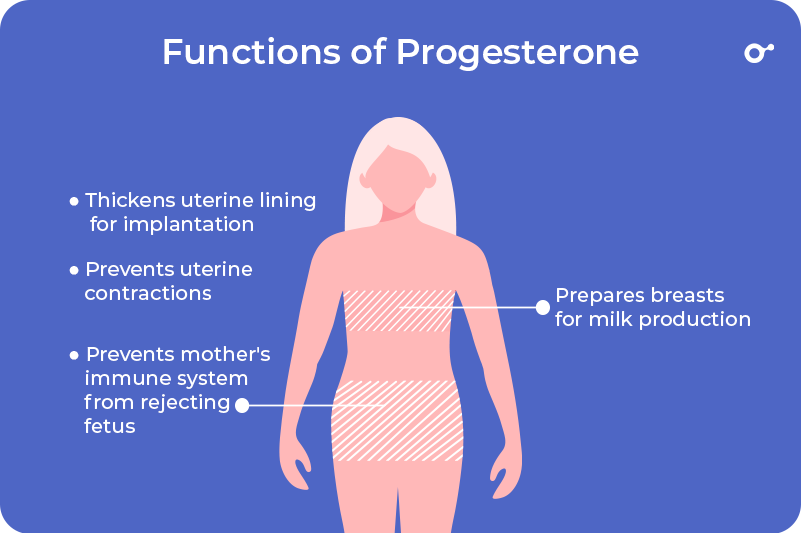
Progesterone is a sex hormone that plays a key role in your menstrual cycle and reproduction.
Every month, your ovaries release an egg from a follicle. This process is known as ovulation. The empty follicle then forms the corpus luteum. This structure produces progesterone, which thickens the lining of the uterus to prep the womb for implantation.
If fertilization doesn’t occur, progesterone drops. This triggers the uterine lining to shed, causing your period to arrive. But if an egg is fertilized, your corpus luteum keeps producing high levels of progesterone for the first 10 weeks of pregnancy. After that, the placenta takes over progesterone production.
Progesterone creates the perfect sticky environment for a fertilized egg to implant. It also prevents uterine contractions to support implantation and prevent early pregnancy loss.
This may explain why low progesterone levels are often linked with an increased risk of miscarriage.
Progesterone also prevents the mother’s immune system from rejecting the fetus and prepares the breasts for milk production.
As you can see, having enough progesterone is crucial if you want to get pregnant and maintain a healthy pregnancy.
Know more: How Does Too Much Progesterone Affect Fertility and Pregnancy?
How Can I Tell if My Progesterone Is Low?
If your progesterone is on the lower side, your body may send you some warning signs. Here are some symptoms of low progesterone to watch for:

- Irregular cycles
- Heavy periods
- Fertility problems
- Severe PMS symptoms
- Hot flashes
- Breast tenderness
- Headaches or migraines
- Anxiety or depression
Progesterone also works to counterbalance the effects of estrogen.
If there’s not enough progesterone to keep estrogen in check, it can lead to estrogen dominance. This can cause symptoms such as:
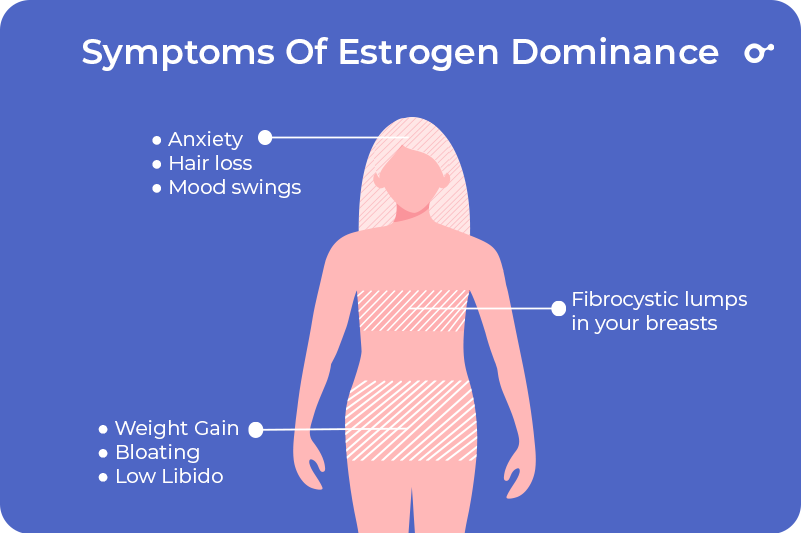
- Weight gain
- Bloating
- Low libido
- Anxiety
- Fibrocystic lumps in your breasts
- Hair loss
- Mood swings
- Irregular periods
Learn More: Estrogen Dominance and How Does it Affect the Body?
The estrogen dominance symptoms above can offer hints about whether your progesterone is low. But really, testing is the only way to be sure. To test your progesterone, you have two options.
The first is a serum progesterone blood test that your doctor orders. This is typically done on day 21 of your cycle or around seven days after you ovulate. That’s because this is when progesterone is expected to peak if you have 28-day cycles.
The trouble is, only around 16% of women have a textbook 28-day cycle. Normal menstrual cycles can range anywhere from 21 to 35 days.
So, for many women, testing on day 21 may not give the best gauge of whether your progesterone is low.
If you do discover your progesterone is low, certain foods may support your body’s natural progesterone production.
See how your hormone chart might look like!
Answer some questions to help us provide you a free personalized hormone chart customized to your hormonal health and conditions
What Foods Help Increase Progesterone?
Let’s be clear. Progesterone is a hormone, NOT a vitamin. So technically, there are no foods that increase progesterone.
However, certain nutrients help your body produce progesterone.
Eating more foods rich in these nutrients may help boost your progesterone levels naturally…which may help you get pregnant!
So, let’s break down which vitamins and minerals support healthy progesterone levels:

Magnesium
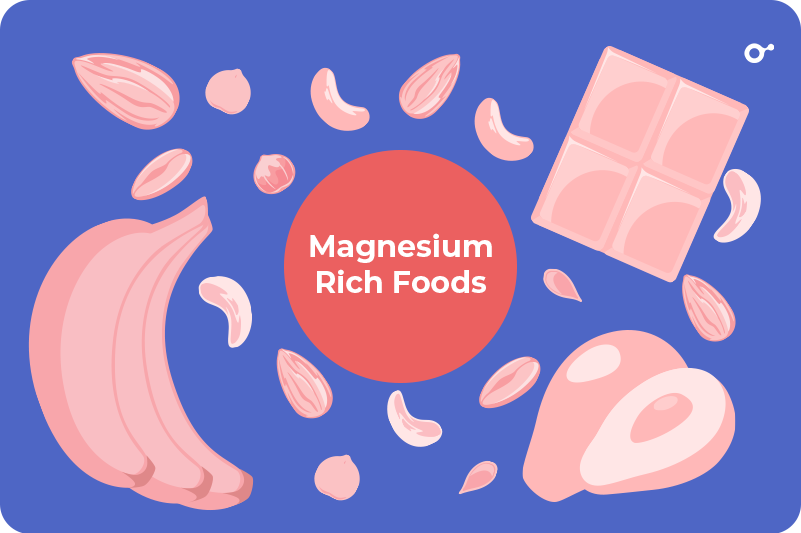
This mineral helps regulate the pituitary gland. Your pituitary gland produces FSH, LH, and TSH – all needed for ovulation. Without ovulation, your progesterone levels will suffer.
Magnesium is also needed to clear the estrogen from the liver, which helps keep the estrogen-progesterone balance in check.
The trouble is, it’s estimated that around 50% of Americans don’t get enough magnesium.
If you suspect you’re one of them, you can boost your magnesium levels by eating more magnesium-rich foods such as:
- Dark chocolate
- Pumpkin seeds
- Almonds
- Cashews
- Avocadoes
- Bananas
- Black beans
- Spinach
Zinc
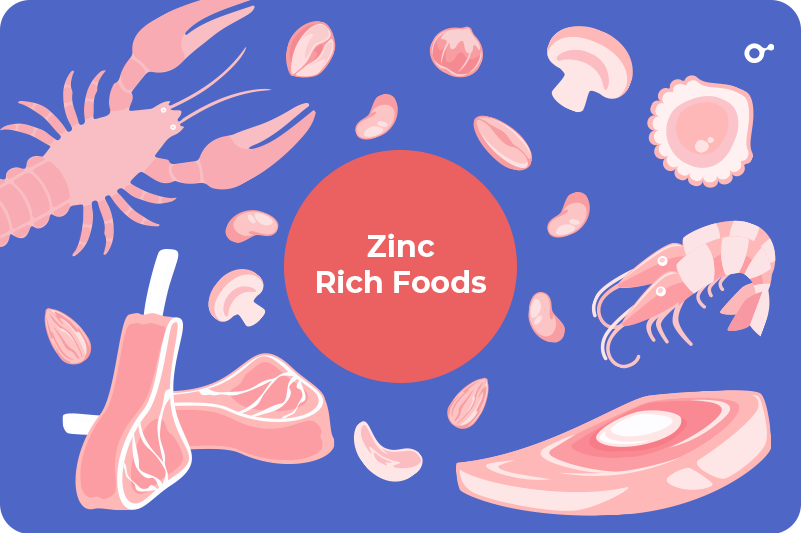
This mineral increases Follicle-Stimulating Hormone (FSH). FSH triggers the growth of the follicle that releases the egg.
As stated, the empty follicle forms the corpus luteum, which produces progesterone during your luteal phase. Eating plenty of foods rich in zinc promotes progesterone production by supporting healthy FSH levels.
Here are some foods high in zinc to consider adding to the mix:
- Shellfish
- Beef
- Pork
- Chicken
- Mushrooms
- Lentils
- Cashews
- Pumpkin seeds
- Oats
- Yogurt
Vitamin C

Research shows that women with higher vitamin C levels tend to have higher progesterone levels, too. In fact, one study from Fertility and Sterility assessed vitamin C’s effects on 313 women with a luteal phase defect.
They found that women who took a vitamin C supplement had higher progesterone levels and higher pregnancy rates.
But you don’t have to take a supplement to boost your vitamin C. You can simply eat more foods rich in vitamin C, such as:
- Bell peppers
- Kiwis
- Strawberries
- Oranges
- Broccoli
- Tomatoes
Vitamin B6
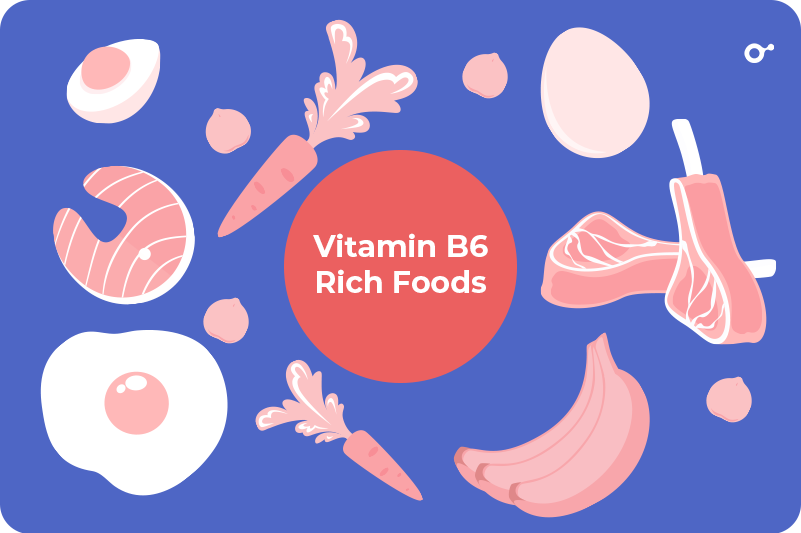
Vitamin B6 is another nutrient that supports progesterone, which may reduce the risk of miscarriage.
In one study, the risk of miscarriage was more than twice as high for women low in vitamin B6 compared to those with high B6 levels. They also found that women low in vitamin B6 had a 50% increased risk of preterm birth.
Another study found that taking 200-800 mg of vitamin B6 each day helped reduce estrogen and increase progesterone.
You can boost your vitamin B6 status to support progesterone, by eating more foods high in this nutrient, such as:
- Salmon
- Tuna
- Chicken
- Turkey
- Beef
- Eggs
- Carrots
- Sweet potato
- Spinach
- Chickpeas
- Bananas
How to Naturally Increase Progesterone?

Besides eating more of the foods listed above, there are several other natural ways to boost your progesterone levels.
Eat a healthy diet
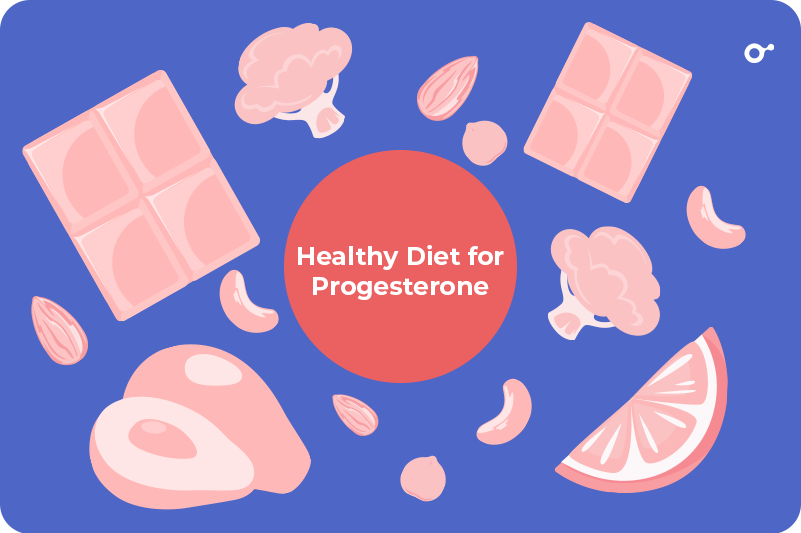
Many processed foods contain compounds that mimic estrogen, which can throw off your progesterone. So ditch processed foods in favor of wholesome foods like fruits and veggies.
Getting plenty of healthy fats is also key. Your body uses cholesterol to make progesterone. So if you’re not eating enough healthy fats, your progesterone production will suffer.
To increase progesterone, be sure to include good sources of healthy fats in your diet, such as salmon, coconut oil, nuts, and seeds.
Seed cycling
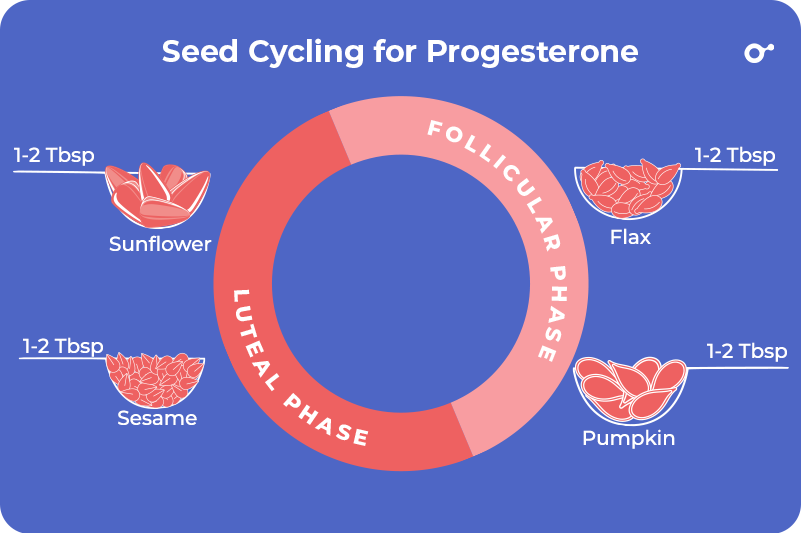
This practice involves eating specific seeds at certain points in your cycle to balance your hormones. Here’s how you do it:
During the first half of your cycle, eat 1 tbsp ground flax and 1 tbsp ground pumpkin seeds each day. This is said to promote healthy estrogen levels.
Then, during the luteal phase, swap them out for 1 tbsp. ground sunflower seeds and 1 tbsp sesame seeds. This is intended to boost your progesterone.
If eating ground seeds on their own sounds unappetizing – no worries! You can add the seeds to smoothies or even sprinkle them over your salads or oatmeal.
Seed cycling has not been proven to have direct effects on your menstrual cycle. However, many women swear by it and have shared their experiences about how seed cycling has helped them.
Take this advice with a pinch of salt and see if it works for you. Try seed cycling yourself and enjoy the benefits, if any.
Maintain a healthy body weight
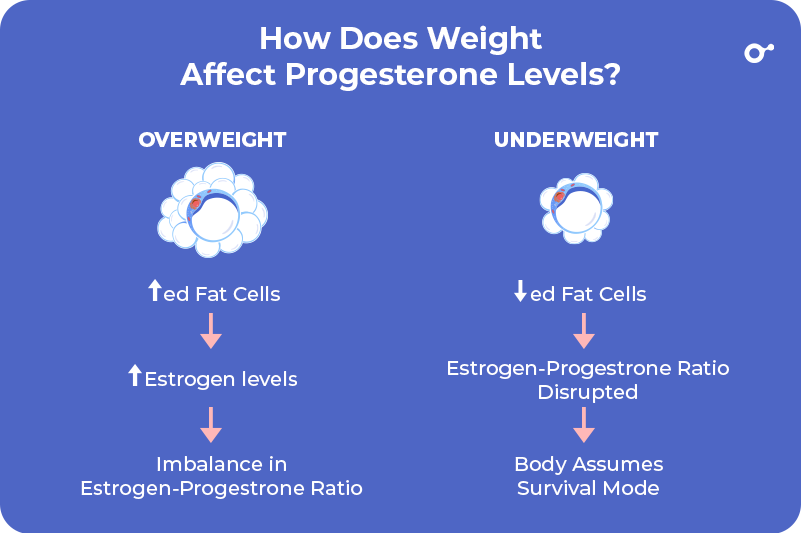
Your body’s fat cells secrete estrogen. So the more excess body fat you have, the more estrogen rises. This can upset the delicate estrogen-progesterone ratio.
But being underweight isn’t ideal for pregnancy either. Not having adequate body fat disrupts your hormones. Your body assumes it’s in survival mode – which is not the ideal time to procreate!
So what’s the sweet spot for weight to get pregnant? Research shows women with BMIs between 20 and 25 conceive the fastest (you can check your BMI here).
Destress
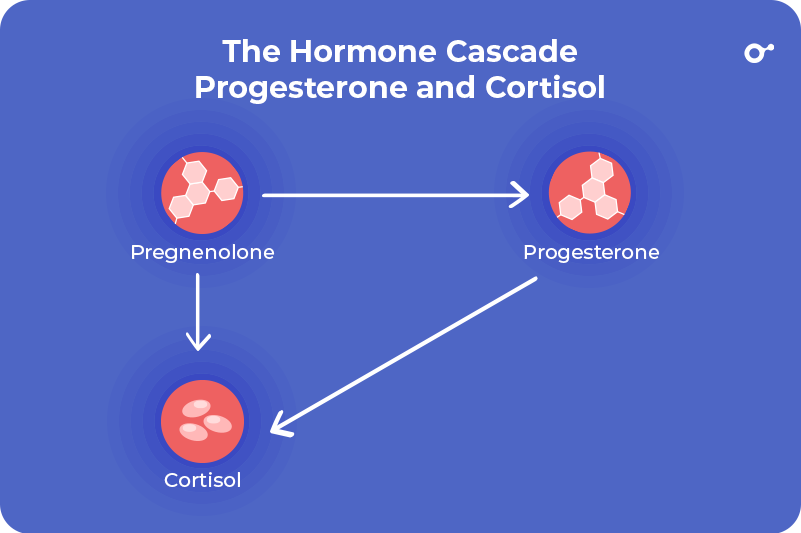
When under stress, your body sends signals to produce more cortisol, your body’s main stress hormone.
The trouble is, cortisol and progesterone are both made from the same starting material: pregnenolone. Progesterone is the precursor to cortisol, made by the adrenal gland. Since the pathways for the production of both hormones overlap, an increase in cortisol causes a decrease in progesterone. So if you’re stressed, your body will prioritize cortisol production, which may reduce progesterone.
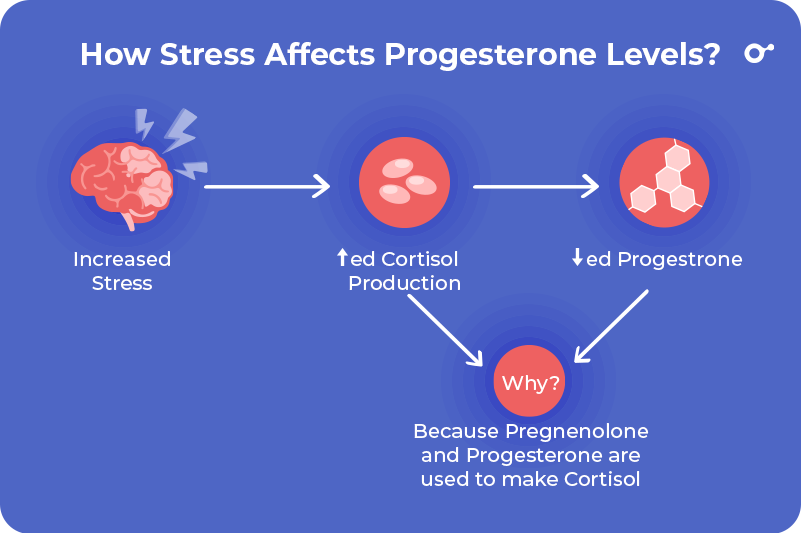
So try setting aside 10-15 minutes a day for stress relief. Journaling, yoga, meditation, breathwork, or spending time in nature are all good options.
Exercise, but don’t overdo it
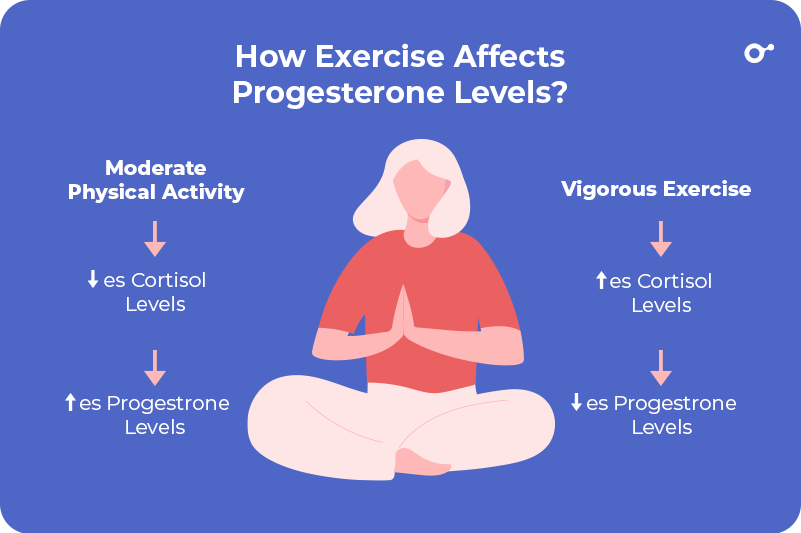
Staying physically active helps reduce cortisol levels. And as mentioned, keeping cortisol in check promotes healthy progesterone levels.
Yet, vigorous exercise can increase cortisol. So if you’re trying to conceive, skip CrossFit and opt for moderate exercises such as walking, biking, swimming, or yoga.
Herbal supplements
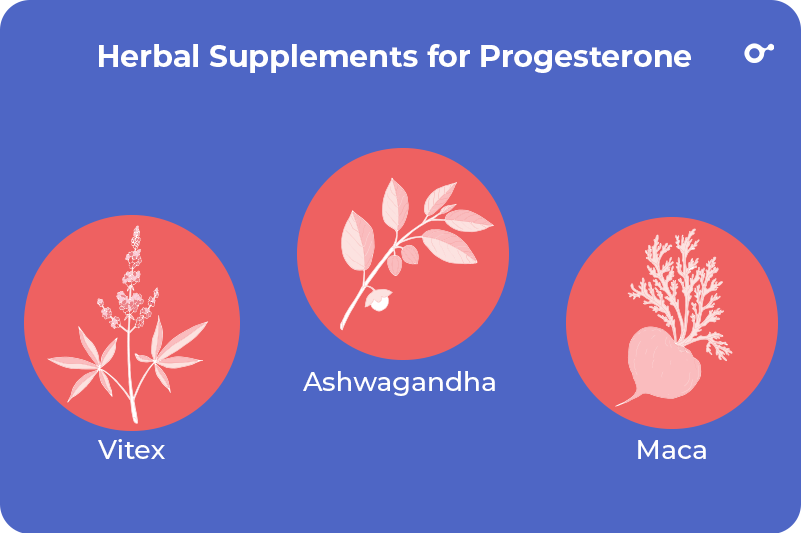
Certain herbs may help increase your progesterone levels, including vitex, ashwagandha, and maca. That said, it’s always a good idea to check with your doctor before adding any new supplements.
- Vitex (also known as chasteberry) stimulates the pituitary gland to produce Luteinizing Hormone (LH). LH is the hormone that triggers ovulation, which is needed to produce progesterone.
- Another option is ashwagandha, an herbal adaptogen that helps your body manage stress. Remember, too much stress can throw off your body’s ability to produce progesterone.
- Maca is another adaptogen that helps build stress resilience.
Research shows maca lowers cortisol levels, which may help boost progesterone.
What to Avoid to Maintain Progesterone Levels?
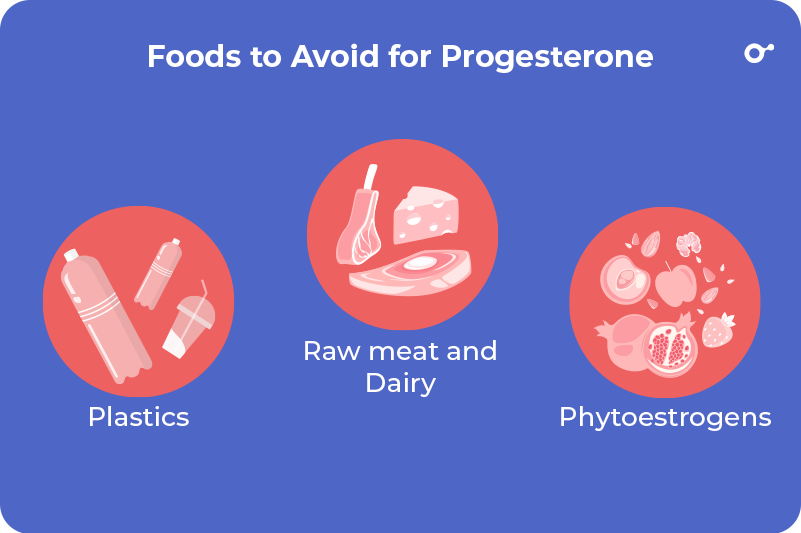
There are certain things you’ll want to steer clear of to support healthy progesterone levels. Here are a few:
Conventional meat and dairy
Conventional meat and dairy products are loaded with hormones. Consuming too many of these foods may throw off the delicate balance of your hormones. So opt for organic dairy and look for meats that say, “hormone-free.”
Plastics
Plastics contain chemicals such as BPA, which can leach into your food and water and disrupt your hormones.
So swap out plastic food containers and water bottles for glass or stainless steel instead. And whatever you do, never heat your food in plastic!
Foods containing phytoestrogens
Certain foods contain phytoestrogens, compounds that mimic estrogen in the body. Research shows phytoestrogens can reduce progesterone production.
Soy products and flaxseed are the foods that have the most phytoestrogens. While these foods are healthy, you may want to limit them, especially in the luteal phase.
When to See Your Doctor?
If you try the tips above and aren’t making much headway in raising your progesterone, it may be time to speak with your doctor.
They may recommend prescription progesterone medications to bring your hormones into balance. Many options are available, including gels, creams, suppositories, capsules, or injections.
Prescription progesterone medications are shown to help reduce the risk of early miscarriage. But they do pose some risks, including increasing the risk of certain types of cancer.
That’s why it’s important to talk with your doctor. They can help you choose the right progesterone support for your own unique health situation.
Was this article helpful?
- Hormones in pregnancy – PMC
- Progesterone-Related Immune Modulation of Pregnancy and Labor
- Inhibition of uterine contractility by progesterone and progesterone metabolites: mediation by progesterone and gamma amino butyric acidA receptor systems
- Activities of Serum Magnesium and Thyroid Hormones in Pre-, Peri-, and Post-menopausal Women – PMC
- Perspective: The Case for an Evidence-Based Reference Interval for Serum Magnesium: The Time Has Come
- Serum Antioxidants Are Associated with Serum Reproductive Hormones and Ovulation among Healthy Women – PMC
- Effects of ascorbic acid supplementation on serum progesterone levels in patients with a luteal phase defect – Fertility and Sterility
- Preconception B-Vitamin and Homocysteine Status, Conception, and Early Pregnancy Loss | American Journal of Epidemiology | Oxford Academic
- Nutritional factors in the etiology of the premenstrual tension syndromes
- Negative lifestyle is associated with a significant reduction in fecundity – Fertility and Sterility
- Pregnenolone – an overview | ScienceDirect Topics
- Physical fitness and prior physical activity are both associated with less cortisol secretion during psychosocial stress
- Determining the association between physical activity prior to conception and pregnancy rate: A systematic review and meta-analysis of prospective cohort studies
- Vitex Agnus-Castus – an overview | ScienceDirect Topics
- Hormone-Balancing Effect of Pre-Gelatinized Organic Maca (Lepidium peruvianum Chacon): (I) Biochemical and Pharmacodynamic Study on Maca using Clinical Laboratory Model on Ovariectomized Rats – PMC
- What is BPA? Should I be worried about it? – Mayo Clinic
- Effects of phytoestrogens genistein and daidzein on progesterone and estrogen (estradiol) production of human term trophoblast cells in vitro
- Phytoestrogens: food or drug? – PMC
- Micronized vaginal progesterone to prevent miscarriage: a critical evaluation of randomized evidence – American Journal of Obstetrics & Gynecology
- The Menopause Years | ACOG



